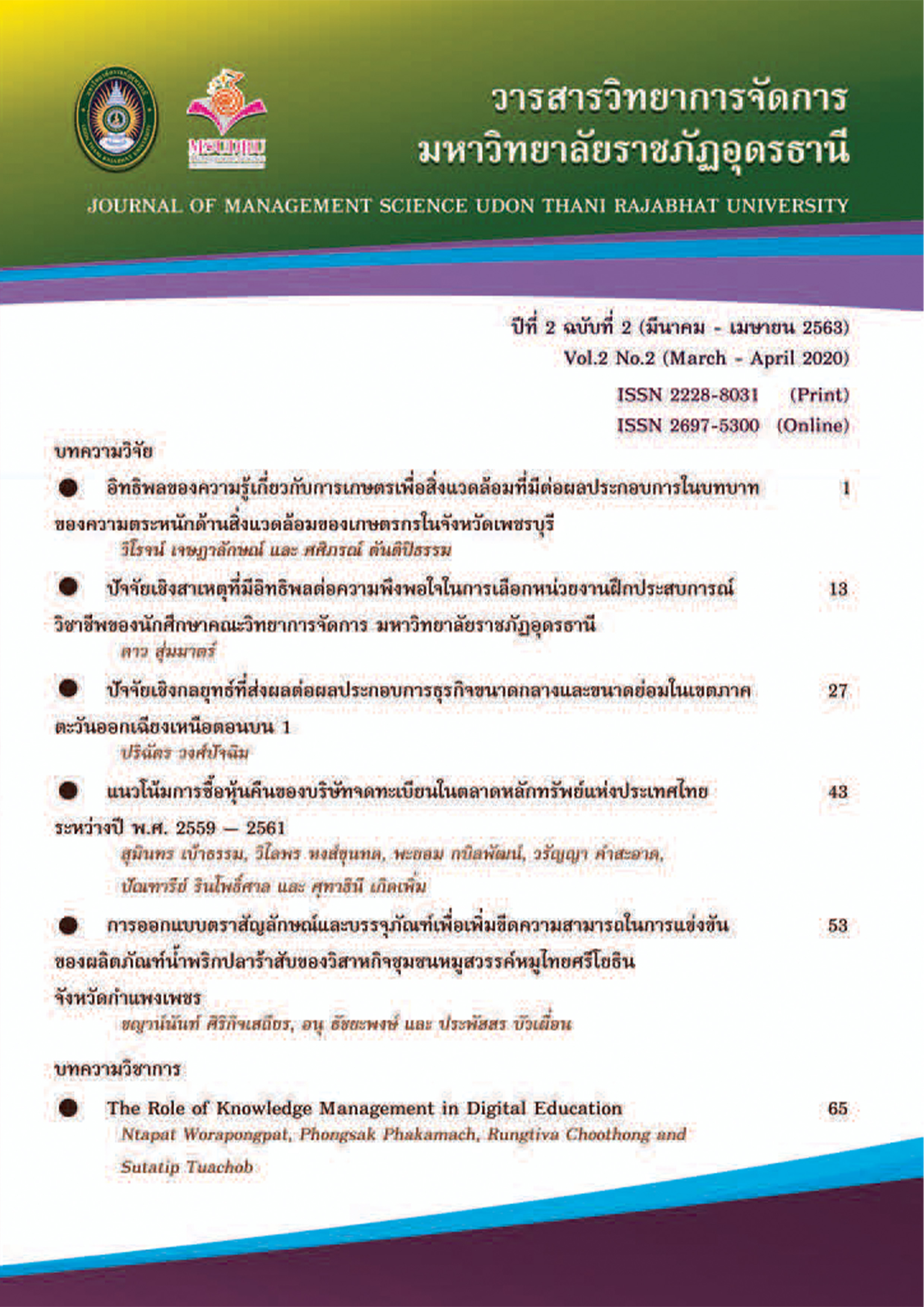บทบาทของการจัดการความรู้ในยุคดิจิทัล
Main Article Content
บทคัดย่อ
สถาบันการศึกษาจำเป็นต้องเอาชนะความท้าทายใหม่ ๆ โดยเฉพาะอย่างยิ่งธรรมชาติที่เปลี่ยนแปลงไปของพลวัตที่เพิ่มขึ้นทางดิจิทัลและความซับซ้อนของข้อกำหนดจากสถาบันการศึกษาหนึ่งในปรัชญาเชิงกลยุทธ์ในปัจจุบันที่ช่วยองค์กรทางการศึกษาในการพัฒนาขีดความสามารถเชิงกลยุทธ์ที่รับมือกับความไม่แน่นอนคือการจัดการความรู้ (KM) ด้วยการได้มาซึ่งการสร้างการแบ่งปันและการใช้ความรู้อย่างเป็นระบบองค์กรต่าง ๆ ต่อการพัฒนาและใช้ประโยชน์จากทรัพยากรที่มีฐานความรู้ของตน ซึ่งจะช่วยให้สามารถทำงานเชิงรุก และปรับตัวให้เข้ากับการเปลี่ยนแปลงภายนอกและธรรมชาติในองค์กรหรือสถาบันใด ๆ เพื่อปรับปรุงประสิทธิภาพ การศึกษาแบบดิจิทัลคือการนำเครื่องมือและเทคโนโลยีดิจิทัลมาใช้ในระหว่างการเรียนการสอน อย่างไรก็ตามหน่วยงานการศึกษาระดับสูงกำหนดให้การศึกษาดิจิทัลต้องมีแผนพัฒนา ซึ่งรวมถึงการศึกษาดิจิทัลหรือแผนดิจิทัลเฉพาะของมหาวิทยาลัย หมายความว่าการพัฒนาทั้งความสามารถด้านดิจิทัลและวิธีการเรียนการสอนที่เป็นนวัตกรรมจะกลายเป็นศูนย์กลางในการพัฒนามหาวิทยาลัย เป็นส่วนหนึ่งของแนวทางของมหาวิทยาลัยทั้งหมด
Article Details

อนุญาตภายใต้เงื่อนไข Creative Commons Attribution-NonCommercial-NoDerivatives 4.0 International License.
บทความที่ได้รับการตีพิมพ์เป็นลิขสิทธิ์ของคณะวิทยาการจัดการ มหาวิทยาลัยราชภัฏอุดรธานี
ข้อความที่ปรากฏในบทความแต่ละเรื่องในวารสารวิชาการเล่มนี้
ไม่ใช่ความคิดเห็นและความรับผิดชอบของผู้จัดทำ บรรณาธิการ กองบรรณาธิการ และคณะวิทยาการจัดการ มหาวิทยาลัยราชภัฏอุดรธานี ความรับผิดชอบด้านเนื้อหาและการตรวจร่างบทความแต่ละเรื่องเป็นความคิดเห็นของผู้เขียนบทความแต่ละท่าน
เอกสารอ้างอิง
Alosaimi, M. (2016). The Role of Knowledge Management Approaches for Enhancing and Supporting Education. Paris: Université Panthéon-Sorbonne.
Al-Tit, A. A. (2016). The mediating role of knowledge management and the moderating part of organizational culture between HRM practices and organizational performance. International Business Research, 9(1), 43-54.
Bedford, D. (2013). A Case Study in Knowledge Management Education ‐ Historical Challenges and Future Opportunities. Electronic Journal of Knowledge Management, 11(3), 199-213.
Dhamdhere, S. (2015). Knowledge Management Model for Higher Educational Institutes. Journal of Commerce & Management Thought, 6(1), 130-161.
Duffin, E. (2020). E-learning and digital education – Statistics & Facts. Retrieved November 18, 2019, from https://www.statista.com/topics/3115/e-learning-and-digital-education/
Harper, M. (2019). What are the Best Four Components of Knowledge Management?. Retrieved November 22, 2019, from https://www.apqc.org/blog/what-are-best-four-components-knowledge-management
Keishing, V., & Renukadevi, S. (2016). A Review of Knowledge Management Based Career Exploration System in Engineering Education. International Journal of Modern Education and Computer Science, 8(1), 8-15.
McLaughlin, C. (2018). What is the digital education? Institute for Academic Development. Retrieved November 18, 2019, from https://www.ed.ac.uk/institute-academic-development/learning-teaching/staff/digital-ed/what-is-digital-education
Nair, B. V., & Munusami, C. (2019). Knowledge Management Practices: An Exploratory Study at the Malaysian Higher Education Institutions. Retrieved November 18, 2019, from https://www.semanticscholar.org/paper/Knowledge-management-practices%3A-An-exploratory-at-NairMunusami/d43332e7f5b953ddbba49247fe627b4e86d7bc9f
Ngoc-Tan, N., & Gregar, A. (2018). Impacts of Knowledge Management on Innovation in Higher Education Institutions: An Empirical Evidence from Vietnam. Economics and Sociology, 11(3), 301-320.
Ojo, A. I. (2016). Knowledge Management in Nigerian Universities: A Conceptual Model. Interdisciplinary Journal of Information, Knowledge, and Management, Vol.11, 331-345.
Omigie, C. A., Ikenwe, I. J., & Idhalama, O. U. (2019). The Role of Knowledge Management for Education in Nigeria. International Multidisciplinary Research Journal, Vol.9, 20-23.
Phakamach, P. (2011). Knowledge Management: A Tool for Organizational Development Based On Modern Management. NEU Academic and Research Journal, 3(1), 151-169.
Phakamach, P. (2019). Knowledge Management Strategies: Key Issues of the Digital Economy & Society. In National and International Conference on Smart Society Development, pp. 162-171. Pathumthani: Pathumthani University.
Shelley, A. (2014). Active Learning Innovations in Knowledge Management Education Generate Higher Quality Learning Outcomes. Journal of Entrepreneurship Management and Innovation, 10(1), 129-145.
Soule, D. L., Puram, A., Westerman, G. F., & Bonnet, D. (2016). Becoming a Digital Organization: The Journey to Digital Dexterity. Retrieved November 28, 2019, from https://papers.ssrn.com/sol3/papers.cfm?abstract_id=2697688
Supermane, S., & Tahir, L. M. (2017). Knowledge Management in Enhancing the Teaching and Learning Innovation. International Journal of Academic Research in Business and Social Sciences, 7(6), 721-727.
Tantray, Z. I., Sehgal, G., & Sharma, P. (2017). Implementation of Knowledge Management & Organisational Learning for Innovation in Tourism: Conceptual Framework. Analytical Insights for Modern Business, Aesthetics Publications, 672-680.
Yu, C. P., Zhang, H. G., & Shen, H. (2017). The Effect of Organizational Learning and Knowledge Management Innovation on SMEs’ Technological Capability. EURASIA Journal of Mathematics Science and Technology Education, 13(8), 5475–5487.


